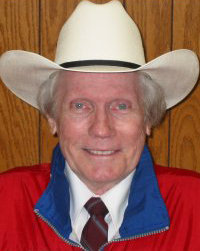
NASHVILLE (BP) –- Fred Phelps, the controversial pastor of the independent Westboro Baptist Church in Topeka, Kan., known for its protests of homosexuals and presidents as well as military funerals and the Southern Baptist Convention, died March 19. He was 84.
 Phelps’ death was confirmed by his church, which he founded in 1955 and which now consists mostly of immediate and extended family members, according to media reports. The church said in a statement on its blog that Phelps had been in declining health for some time and had now “gone the way of all flesh.”
Phelps’ death was confirmed by his church, which he founded in 1955 and which now consists mostly of immediate and extended family members, according to media reports. The church said in a statement on its blog that Phelps had been in declining health for some time and had now “gone the way of all flesh.”
“The world-wide media has been in a frenzy during the last few days, gleefully anticipating the death of Fred Waldron Phelps Sr. It has been an unprecedented, hypocritical, vitriolic explosion of words,” the church said.
Phelps adopted his now-infamous protest strategy in 1991 after officials in Topeka failed to curtail the activity of homosexuals committing “indecent acts” in a public park near his home, as recounted in a New York Times report. Since then, Phelps and his followers have made headlines by declaring God’s judgment on America, most clearly expressed, they said, in the open practice and public acceptance of homosexuality, the plague of AIDS and the death of American soldiers in war.
According the church, it has held more than 52,000 “pickets” in 922 American cities. The church says it is preaching the “gospel message” through demonstrations with signs that read “God hates America,” “Thank God for dead soldiers” and “God hates ‘fags’.”
In a 1998 interview with the Houston Chronicle, Phelps described his message: “You can’t believe the Bible without believing that God hates people,” he said. “It’s pure nonsense to say that God loves the sinner but hates the sin. He hates the sin, and he hates the sinner. He sends them to hell. Do you think he loves the people in hell?”
In 2010, Roger S. Oldham, vice president for convention communications and relations with the SBC Executive Committee, disavowed any connection between the SBC and Phelps’ practices and any comparison between his hatred of people and the true Gospel of Christ after the group conducted protests at the funerals of soldiers killed in Iraq and Afghanistan.
“We repudiate the tactics used by Fred Phelps and his followers at Westboro, and find them offensive,” Oldham told Baptist Press. “However, we do not rush to cast stones at them. We rather grieve for them. We grieve when any individual or group that identifies itself as Christian draws attention to itself and away from the cross of Christ, whether it is us or others.
“This church has no relationship with the Southern Baptist Convention. I do not know any Southern Baptist who does not share my sorrow and grief that this group distorts the message of the cross and reflects poorly on Christians in general and Baptists in particular.”
SBC leaders rejected any association of the SBC and Westboro Baptist Church on numerous occasions, including the 2010 Baptist Press story and earlier BP reports in 1999, 2003 and 2005, as Westboro staged protests outside of Southern Baptist offices and at several SBC annual meetings.
Born in Meridian, Miss., in 1929, Phelps once had a promising future. He claimed to have been appointed to the U.S. Military Academy at West Point but did not enroll after a “profound religious experience,” according to a biography. He established Westboro Baptist Church in 1955 and filled the pews of the church mostly with his family of 13 children, 54 grandchildren and seven great-grandchildren.
According to the Associated Press, Phelps earned a law degree in 1964 but he did not practice long before being accused of misconduct. He was disbarred in 1979 in Kansas and was later accused of misconduct by multiple federal judges. Phelps stopped practicing law in the federal courts in 1989.
In 2011, the Supreme Court, which Phelps often blasted for legalizing sodomy, said his protests — including those at military funerals — were protected free speech.
The New York Times and the Topeka Capital-Journal, citing Phelps’ estranged son and other sources familiar with the internal workings of the church, said elders of Westboro Baptist Church had excommunicated Phelps in 2013 after he advocated the “kinder treatment” of church members. The sources also described a continuing internal power struggle in the congregation.
The church addressed rumors of a power struggle on its website, calling journalists “a bunch of little girls on the playground waiting for some gossip.”
–30–
Gregory Tomlin is a writer based in Fort Worth, Texas.













